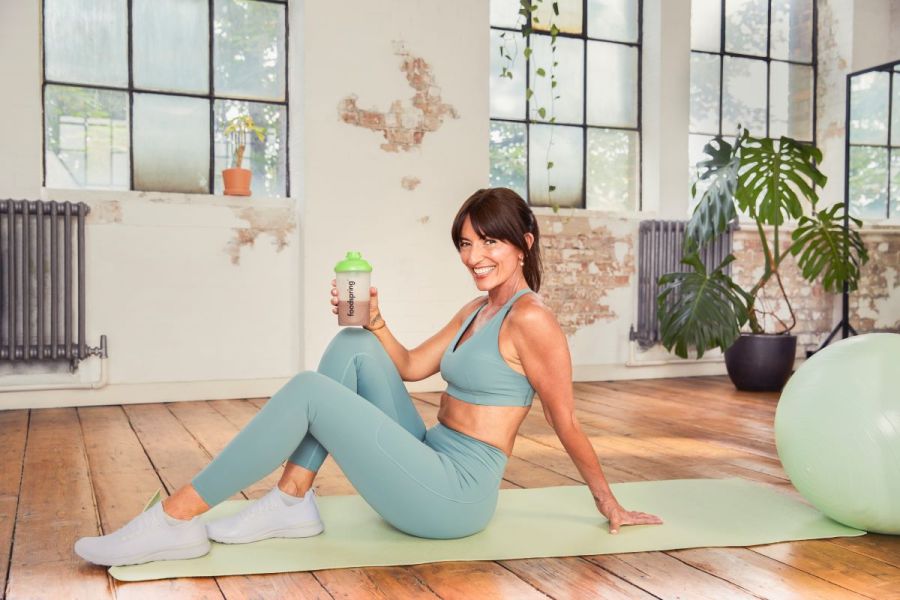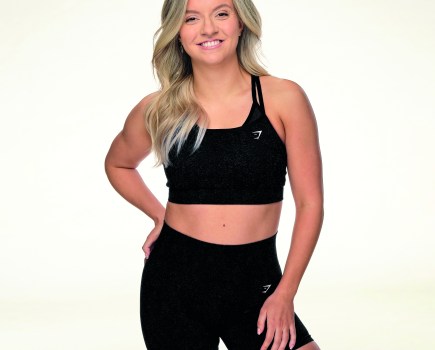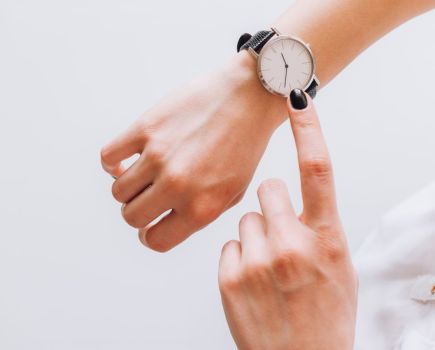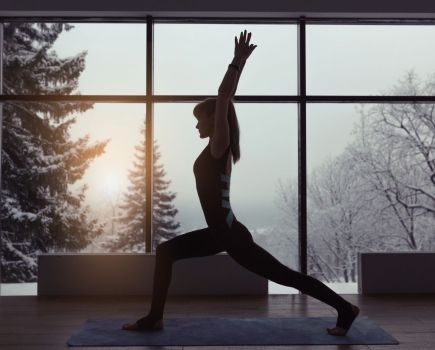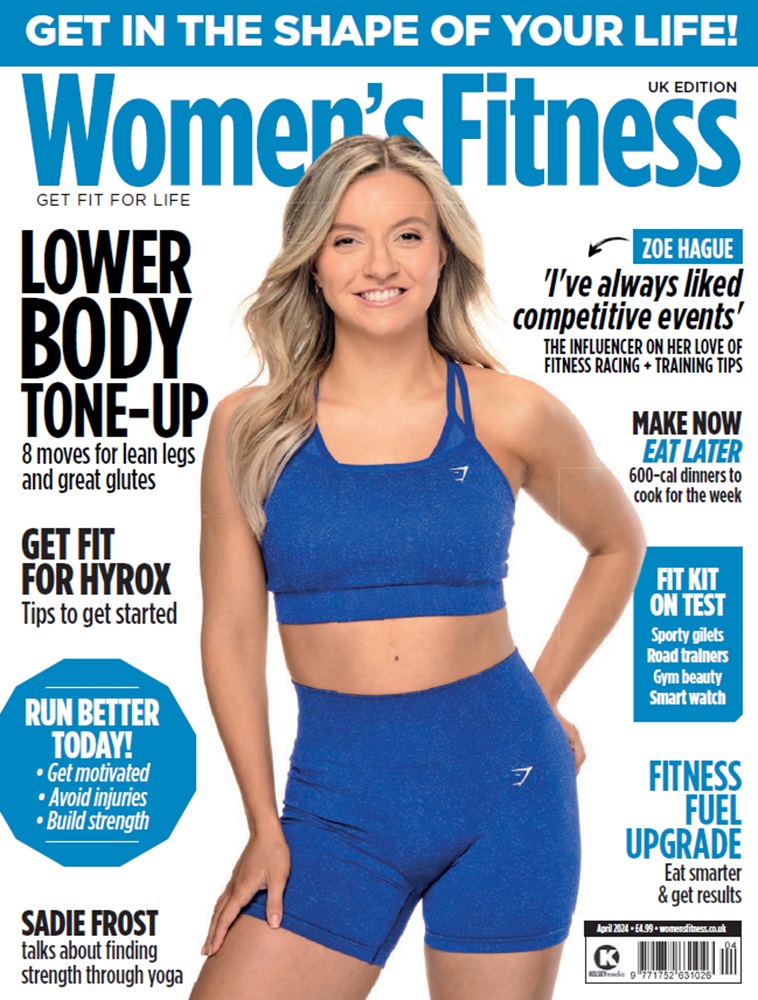British TV presenter and fitness queen Davina McCall, 56, tells us about intermittent fasting for gut health, swapping sugar and carbs for protein, and why exercise is crucial for maintaining her mental health as well as muscle tone.
There’s no doubt about it: Davina McCall is officially one of the UK’s most beloved national treasures. When she’s not entertaining the nation with hit TV shows including My Mum, Your Dad; Long Lost Family; and The Masked Singer, she’s educating us with critically acclaimed documentaries such as Sex, Mind and the Menopause and Davina McCall’s Pill Revolution, along with her latest book, Menopausing, which scooped the top prize at the British Book Awards last year.
Then, of course, there’s her successful fitness empire, which has seen the exercise guru, presenter, and mum-of-three release no less than 15 workout DVDs with sales over 1.4 million, as well as the popular online fitness platform, Own Your Goals.
In fact, Davina has been extoling the benefits of exercise for so long, it’s hard to remember how her foray into fitness first began. With that in mind, we took Davina on a trip down memory lane before asking about her preferred methods of exercise today and finding out about her exciting collaboration with nutrition brand Foodspring on a range of protein powders aimed at supporting women. Get ready to feel inspired!
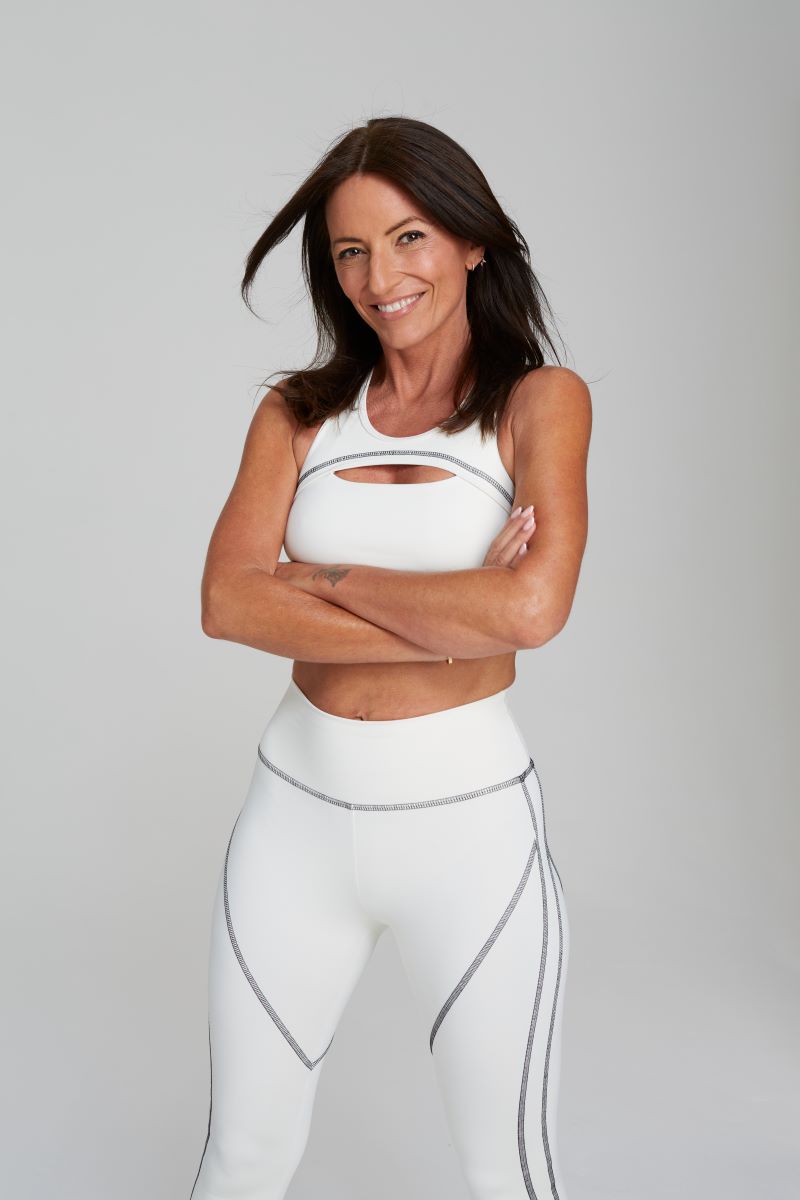
‘Dancing non-stop for six hours used to be my exercise!’
Davina McCall on her fitness journey
‘I didn’t really do any exercise apart from clubbing until I was 25. In fact, up until I was 25, going out on a Thursday, Friday, and Saturday night to dance non-stop for six or seven hours was enough. But then I gave up smoking, and I immediately put on a stone almost overnight. Then, I thought, “I’ve got to do something about this!”, so I decided I’d better start going to the gym.
‘I joined a local gym where the Wasps rugby team used to train. Here, I would do absolutely nothing except talk to absolutely everybody until the team came in, and then I’d suddenly work out like a maniac to the point where I couldn’t walk for five days afterwards. I guess I was very sort of sporadic [with my training], trying to do it but not really understanding the physical or mental benefits. Really, I just didn’t get it.
‘I kind of bounced back after having my first child. But after having my second child, Tilly, I thought, “I’m in big trouble here”. You know how there are some women who look like somebody’s just put a football up their t-shirt when they’re pregnant and they don’t gain weight anywhere else? I definitely wasn’t that person. I put on weight everywhere, and my body was suffering. My feet were so swollen, I had wear Crocs all the time and buy flat shoes in a bigger size to wear on TV I was that heavy.
Making changes
‘I knew I needed to build a bit of muscle to support the weight. What I didn’t know was whether I could start my workout journey while pregnant. I looked up personal trainers in my local rag and found a couple called Jackie and Mark Wren. I called Jackie and she said I could definitely start training while pregnant; I’d just need to start off very gently because my body was producing relaxin, a hormone that relaxes your muscles and tendons. She also said if I started training in pregnancy, we’d have a basis to work from once I resumed training after I’d had the baby. I thought that sounded amazing.
‘After I had Tilly, I went back to Jackie and Mark. Around a year after I’d given birth, I hadn’t lost all the original weight, but I did look and feel miles better. I looked tighter, fitter, and I was happier. I remember going to a red-carpet event where everyone was taking pictures of me and I was thinking, “bloody hell, what’s going on?!”. My picture was everywhere the next day, and I spent all day trying to explain to people that my “transformation” was all down to training with Jackie and Mark.
‘Shortly afterwards, I said to my agent, “I think I need to do a workout DVD”. But he basically said that doing a workout DVD was a bit tacky, and I shouldn’t do it. I said, “no, this will be a real one, because these guys really did change my life and you’ll see that in the DVD.” And that was that! That’s how I became “fitness lady”.
Fitness and perimenopause
‘My training completely changed when I became perimenopausal. I realised I wanted to do a lot more strength training, and I didn’t want to beast myself anymore. Because I know myself, and I know that when I beast myself or try to do the most reps I can in however many minutes, my form suffers. And when my form suffers, I get injured. And then I’m out for a week and I get really depressed. I didn’t want to do that anymore.
‘For me, fitness is about doing a bit of everything. I do some yoga, Pilates, strength training, bodyweight training, cardio, one or two runs a week, and maybe a spin class. It’s about having variety all the time, never doing the same workout, and keeping things fun. Ideally, I train three or four times a week, usually following one of my little fitness challenges that run on Own Your Goals. When I follow a challenge, it keeps me motivated to keep going back.
Mental health benefits
‘I benefit so much from exercise as it helps my mental health. And sometimes, that will be my one motivator to train. I’d probably say I don’t train for my body – I train for my brain. The fact that exercise will give me shoulders or great calf muscles is a wonderful byproduct of what it does for my mental health, for sure.
‘I use my own bodyweight a lot in training. With the changes happening in my body, I need to do strength training for my bones, but also especially for my muscle tone, because muscle tone is the thing that’s actually really hard to keep hold of. It doesn’t matter how saggy or crepey your skin gets: if you’ve got nice muscle tone underneath it, you’ll still look great.
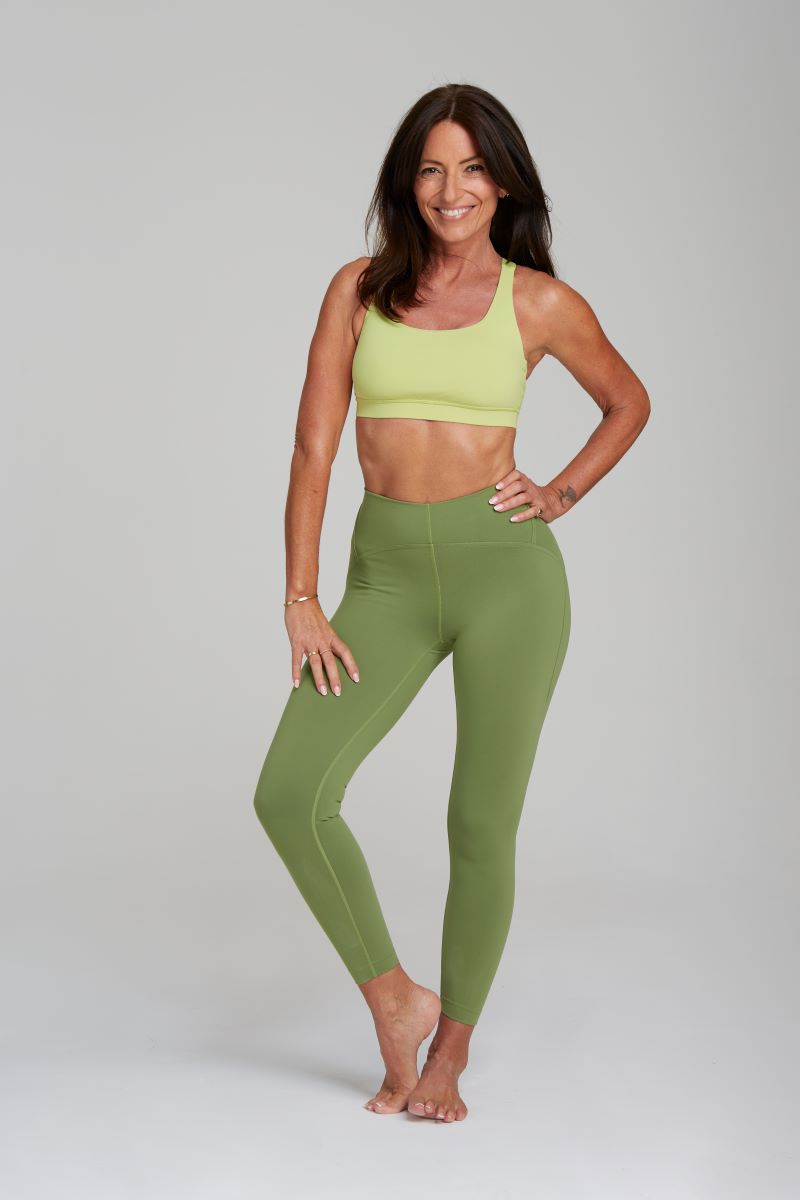
‘These days, I intermittent fast, which means I often don’t eat until lunchtime’
Davina McCall on the importance of protein
‘Protein is so important for energy, brain function, building muscle – everything! In an ideal world, we would be eating a diet that gives us enough protein, but I know that for many of us, that can sometimes be difficult. Losing muscle tone is something perimenopausal women suffer with, so we need all the help we can get!
‘I sometimes struggle to get enough protein every day, and that’s when I’ll reach for one of my Foodspring x Davina McCall Protein + shakes. When I met Foodspring, they got me in a lab coat and properly on-board so I could really see what is behind their products and how much science is involved in what they make. I wanted to come up with two products that I thought would be great for women because, as I’ve learnt, protein plays a big part in my diet and it’s important for every part of my body – it’s not just about exercise.
Protein and muscle mass
‘I think there’s a misconception that protein powers are for men with muscles, or that might make you put on too much muscle. But if you’re someone who works out a lot, or you’re in midlife and you struggle to get enough protein, then a supplement can really work for you.
‘I usually have a shake 3-4 times a week on those days when I’m exercising, or at the end of the day when I think I might not have eaten enough protein, because work can often mean I’m not always eating as well as I should be. Protein has got to be a tailored thing and you’ve got to adapt it for your own needs.
‘And I know I shouldn’t have favourites, but sometimes I drink the Protein + Relax powder with warm milk at night just because it makes me feel all cosy and lovely before bed! It has a soothing honey and spice taste that’s fricking delicious, but it also contains ashwagandha to help my body and mind relax. And it’s made using a slow-absorbing protein called casein to help the body recover while it sleeps.
Davina McCall on healthy nutrition
‘Until recently, I never ate protein for breakfast. Going back five or six years ago, I was a crumpet, honey and butter person, but I’ve learnt more and more about nutrition over the years, and I don’t want to start my day with sugar and carbs anymore. These days, I intermittent fast, which means I often don’t eat until lunchtime. But having a protein shake is perfect for breaking my fast around 10.30am if I need something before 1pm.
‘Intermittent fasting doesn’t suit everyone, but it really agrees with me. I got to a stage after my mid-40s where I was bloating a lot at night, and it didn’t seem to be going by the morning. I felt like there was something going on with my gut, so I took part in a bit of research on intermittent fasting through the free Zoe nutrition app (zoe.com). Every day, I fasted for 14 hours, which meant finishing dinner by 8pm and breaking my fast at 10am, and I found that really achievable.
Benefiting from intermittent fasting
‘Intermittent fasting showed me I ate a lot more food after 8pm than I thought. Really, I only noticed when I said to myself, “right, now it’s just water until tomorrow morning”, and then found myself reaching for carrots and houmous or crisps when watching telly. I thought I ate dinner at 7pm and that was it, when actually I was having another dinner later on!
‘I feel miles better now with way more energy in the morning. Also, I always used to think I had to eat and then work out, but I don’t need to do that anymore. I’ve got plenty of energy when I wake up, so I’ll have a couple of black coffees before I work out and I feel amazing. Learning that my gut needs a moment to cleanse itself without throwing more food at it was an important lesson for me to learn.
Caring for the gut
‘My food philosophy is pretty simple. I try to eat as many colours and as much raw food as I can. And because I now know a lot more about my gut microbiome, I’m trying to eat more live cultures. I’d love to say I’m as hardcore about sugar as I was after my sister died in 2012 – I’ve fallen off the wagon a little bit since then – but I’m really a lot better with chocolate. Sugar is my Achille’s heel, but the moment I eat anything sugary like cakes or biscuits, I know it’s not good for me, because I can feel it.
‘I’m also trying to eat less red meat and processed meat. I love sausages but I just know they’re not great for me. Sometimes, knowledge is quite depressing! I avoid all the things I grew up with, like salami and hams, which are all forms of protein, but they’re forms of protein that are possibly not suiting my body and my needs. I also try to avoid saturated fats, but I know a little bit of dairy is fine for me, and there’s nothing wrong with having some butter on your broccoli. It’s all about adding interesting foods into my diet to make it better: not about giving too much stuff up anymore.
The Foodspring x Davina McCall Protein + range, consisting of Protein + Focus and Protein + Relax (both £29.99 for 480g), is available exclusively from Superdrug and Foodspring.
Words: Joanna Ebsworth. Images: Foodspring

